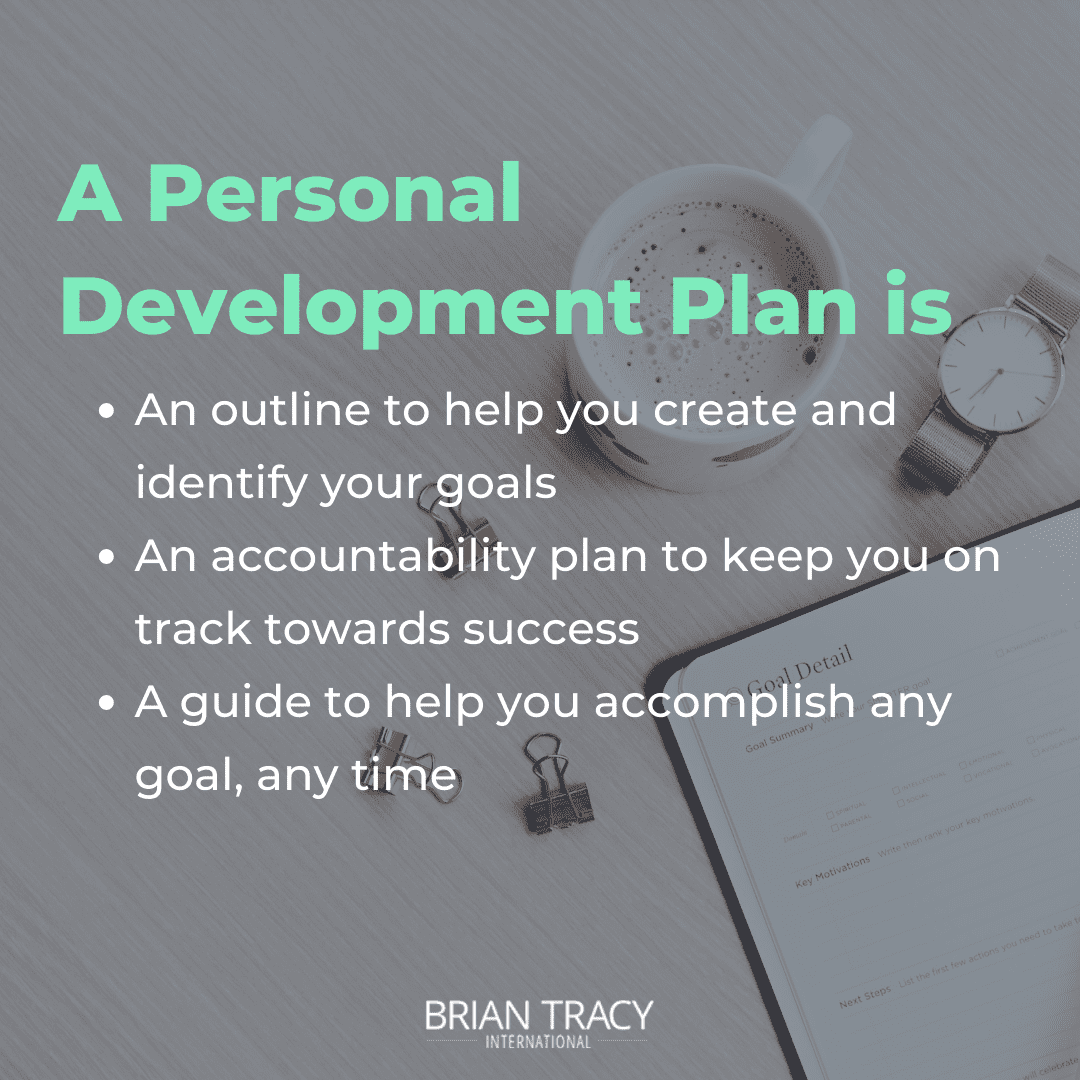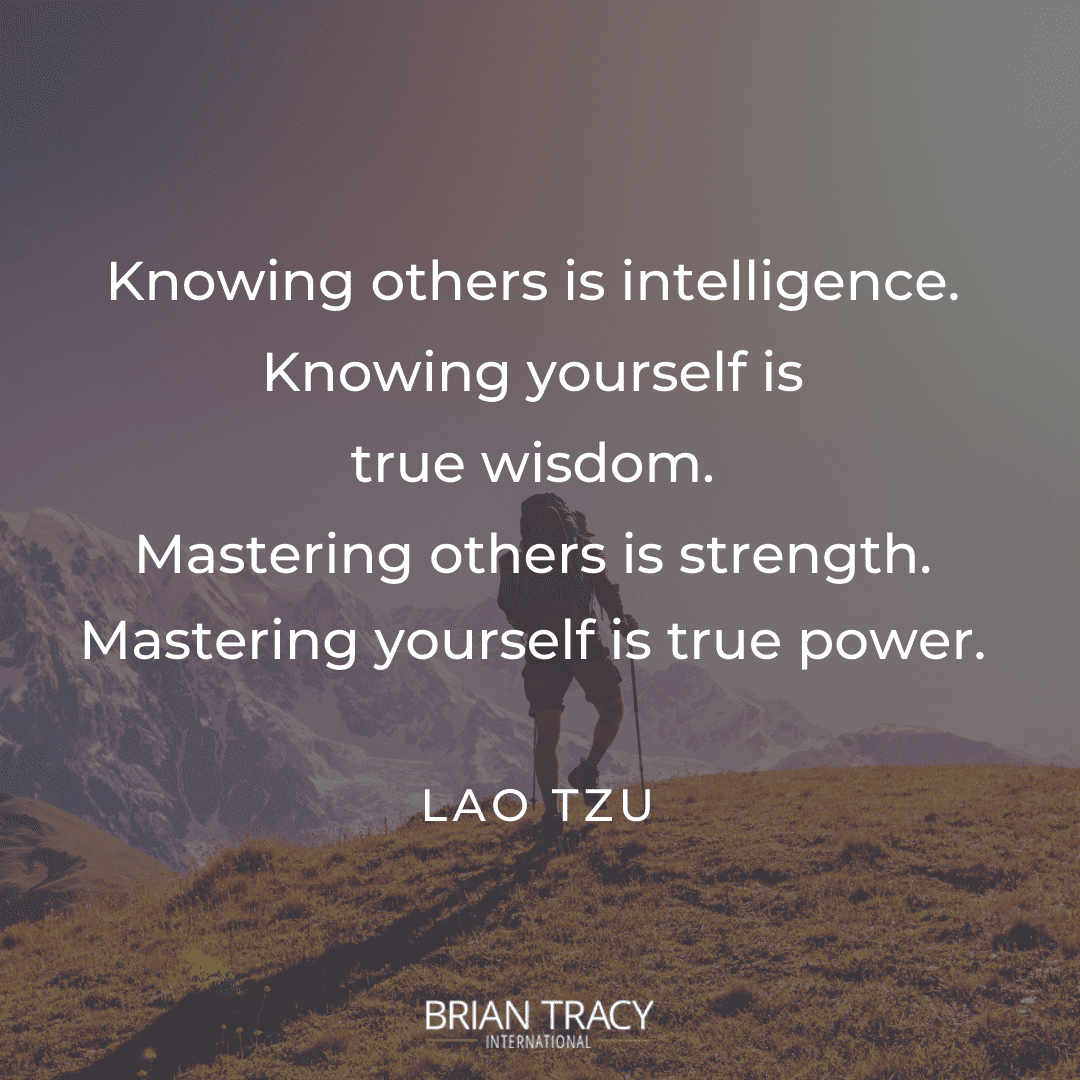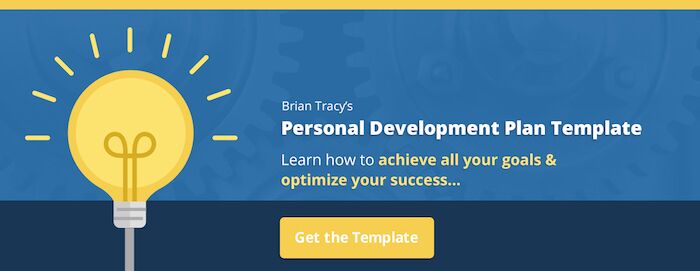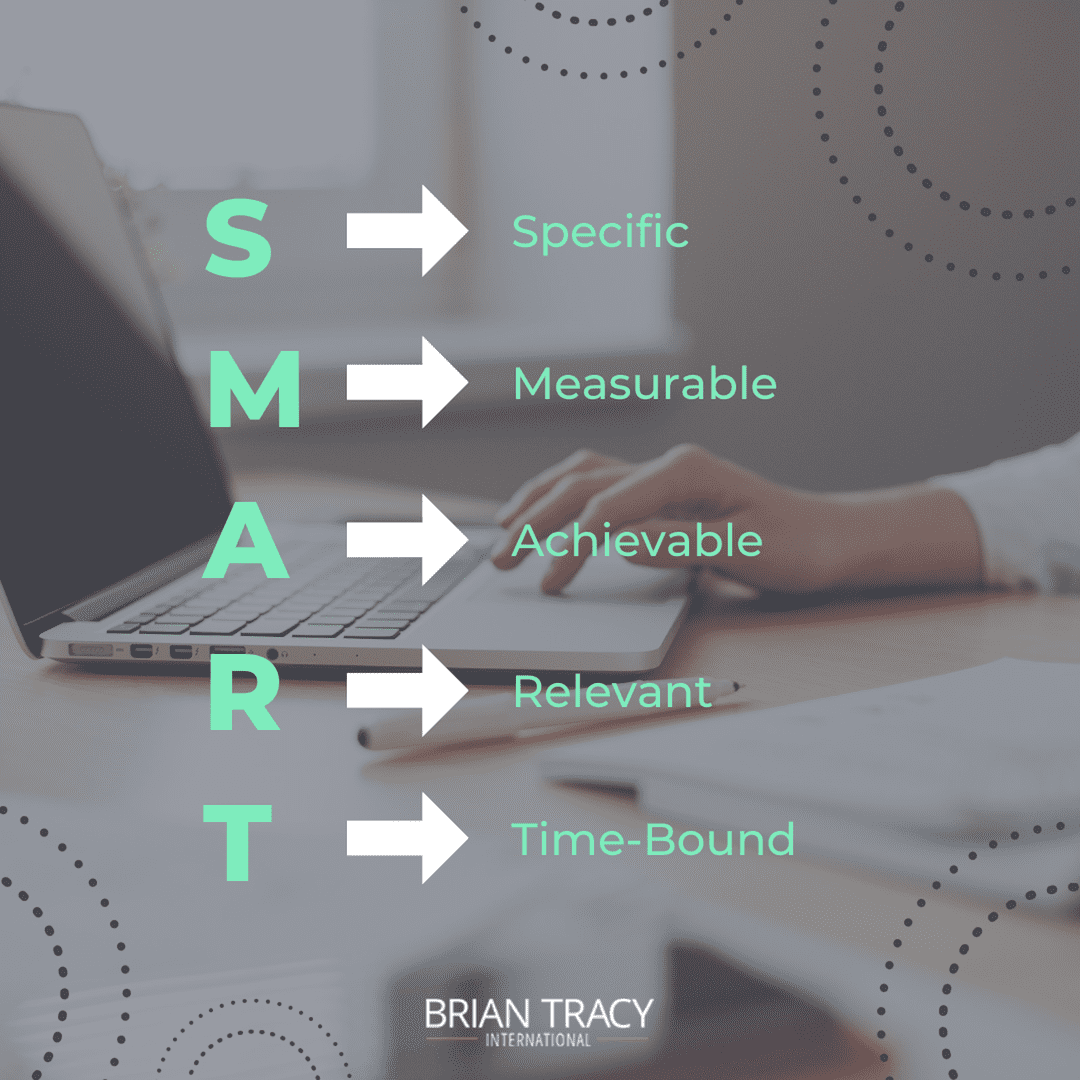
Did you know you can make your dreams and aspirations a reality by focusing on your own individual personal development plan?
Your potential is limitless, and investing in personal development is a way to harness your many talents.
Establishing goals for what you want to achieve — where you would like to go in the short term or long term — can improve your personal development.
In this guide, I’ll help you understand what personal development means and its importance, what a personal development plan is and why you should make one, and how to write a personal development plan.
I’ll also share with you my personal development plan template to get you started on your path to reach your personal development goals, complete with helpful examples and resources to support you.
A personal development plan is a guideline for your life and your future success.
Personal development is an ongoing process of improving oneself through conscious habits and activities. It is the pursuit of personal growth to enhance your quality of life and to achieve your dreams and aspirations.
When you create a plan, you start to define the kind of person you want to be, the skills you want to have, and the accomplishments you want to achieve. And then you map out your long-term and short-term goals to realize these aspirations and set timelines for when you want to reach them.
Many people underachieve in their careers because they do not realize the areas of personal development that can help achieve mastery in any field.
Effective leaders focus on continual self-improvement and know there is no substitute for hard work.
When you practice self-discipline by setting a goal, making a plan, and working on it every day, you will see personal development and progress within your career.

Most of the time, what you think about is what you become. From the moment you wake up until the moment you close your eyes at the end of the day, everything you experience plays a factor in your development.
When you take greater control over your experiences, you can guide your personal development and accelerate toward what you want to become instead of leaving it to chance.
Setting, striving for, and meeting personal development goals opens up a world of new possibilities for you to increase your quality of life.
For example, as a result of creating and following your personal development plan, you may gain more responsibility for work and open up opportunities for higher pay. This growth could qualify you for a better career trajectory to increase your overall happiness, job satisfaction, and ability to provide for the life you want for you and your family.
Focusing on your personal development also gives you better decision-making abilities so you can avoid problems that may have plagued you in the past or are holding you back now.
At the end of the day, personal development helps you create more positivity and harness the power of positive thoughts, which can transform your life.
When you give time to yourself by focusing on your professional and personal growth, you are better able to achieve your version of success because of personal development opportunities.
Recognizing the difference between self-improvement and personal development can be a little tricky.
While they are similar in that they are both very instrumental in achieving your goals and improving yourself, there are key differences between a self-improvement plan and your own personal development plan.
Personal development is the work you are putting in to transform yourself on a daily basis. It’s the efforts you’re making to advance in your work, lifestyle, attitude, physique, and sociability.
Setting personal and professional development goals and creating a plan helps you take full advantage of any opportunity that may come your way and make the most of your potential.
Self-improvement is an inner transformation. It is a self-motivated study to improve one’s character, status, or knowledge by their own efforts.
Self-improvement is a lifelong process of constantly searching for ways to change your habits so you can reach your fullest potential.
The specific efforts you put into personal development lead to self-improvement.
Focusing on personal development categories such as personal skills, personal growth, and personal power can create habits for personal improvement.
Personal growth is founded on education and skill. Through education and experience, you increase your skill level and your ability to succeed in your field.
There are seven main categories of personal development.
Personal skills can be ones you were born with as well as those you gain through deliberate practice. They’re often referred to as soft skills.
Examples of personal skills are decision-making, teamwork, organization, and communication.
If you’re looking to develop skills at work, try working on your personal skills. The highest-paid, top individuals in their field are the ones who focus on growing their personal skills.
Knowing what areas you excel in and which need development is very useful in your personal and professional life.

Having a personal growth plan is one of the first steps toward bettering yourself and stepping out of your comfort zone.
Humans and the human mind are constantly evolving. Think about it: you are not the same person you were a year ago. You’ve learned more, grown in many different ways, and have experienced more life events to further shape your personality, beliefs, and world outlook.
To experience personal development and have a growth mindset, strive to be a better version of yourself today than you were yesterday.
Personal power is the authority others believe you to have in certain situations and is fueled by your contacts, knowledge, and financial status.
Developing an ever-widening circle of contacts, seeking to learn more, and growing financially increases the number of doors that others will leave open for you to step into.
Expanding your network, knowledge base and financial status will also allow you to help others do the same, further increasing your personal power and opportunities for personal development and growth.
Personal improvement stems from good work habits and having a positive mental attitude.
Thinking before you act is critical to developing a strong amount of personal improvement. To help you think first, try to set priorities on a list and consider the likely consequences before beginning.
Working on personal improvement and generating a positive mental attitude will also reduce the amount of time that it takes you to achieve your goals.

Personal empowerment is similar to Personal Power, except empowerment is the power to reflect what you see within yourself, instead of how others view you.
Promoting a positive image and adopting creativity within your daily life can speed up the time it takes to achieve personal empowerment and your goals.
To help you increase your personal empowerment, consider looking for new, creative ways to finish a project in a faster, easier or cheaper way without compromising the end result.
It is very important to be conscious of areas in which you are naturally gifted as well as analyze areas in which you need improvement. This is called personal analysis.
Being truthful about where you currently stand is the first step to moving forward. You should be constantly evaluating where you are when achieving your goals and ambitions.
Ambition goes to waste when there are no clear goals in sight. Developing clear direction for short-term and long-term goals is a pivotal step in actually accomplishing them and growing as a person.
Having a set plan will help you have a clear understanding of which strategies are necessary to reach your desired destination.

The reason you need to create a personal development plan is that making a plan will help guide you to better decision-making and remind you of where you want to go.
In other words, good preparation increases the probability of success and decreases the risk of things going wrong along the way.
Creating a plan for personal development helps you get a better sense of control over your life and will make you better prepared for whatever comes your way.
Consider these benefits of having one:
Developing your personal development plans and goals for work can make the difference between success and failure. Creating a self-growth plan for your personal life can mean the difference between life-long happiness and regret.
The objectives of personal development are continuous personal growth, increased potential for success, and capitalizing on potential opportunities.
You can practice your personal development skills by setting aside time for the important people in your life, performing action exercises that force you to perform at the highest level, and studying growth performances to help ensure you continue to climb the ladder of success.
An action plan has to include measurable objectives so you know the exact steps it will take to reach your goals. Objectives break your larger personal goals into bite-sized pieces so you can know where you are headed and check off your progress along the way.
There are no limits except for the limits you place on yourself with your thinking.
Commit yourself to a life of constant learning. Even if you are at the top of your field, there is always something to learn.
Once you have mastered a new skill, move on to learning another one. Constantly learning new skills keeps your mind fresh and active and opens doors that would otherwise be closed to you.
You will become unstoppable and you will see your entire future open up in front of you if you live a goal and growth-oriented life.
Before you can set up a plan, you need to do some self-reflection and answer personal goal questions.
A few questions you should develop before laying out an idea for a specific plan of action are:
After answering those questions, you can create a personal plan that contains a few key components.
The key components you should focus on are having a specific outcome that you are constantly working towards, planning and paving a path towards achieving it, being mindful of the obstacles, and understanding the bigger motivation behind your actions.
When developing a personal development plan for work, you should focus on SMART goals. SMART stands for “Specific”, “Measurable”, “Achievable”, “Relevant”, and “Time-Bound.”

Set Goals for Professional Life
To make progress that you can see and track in your professional life, you need to document a detailed plan of action for your personal development.
Some examples include answering the following questions:
Be as specific with your answers as possible. The more precise, the easier it is to track your progress.
Seeing how far you have come and how your hard work is paying off will give you a boost of confidence and provide a sense of accomplishment.
Some examples of personal development goals for work include the Golden Hour and the 21-Day Mental Diet.
The Golden Hour Rule steers the trajectory of your day.
Beginning your day early and investing your first hour in yourself will make a tremendous difference in the way you feel, and you will begin to see positive results in your day.
You will begin to see yourself in a more positive light and improve on your self-awareness and personal development.
The 21-Day Mental Diet personal leadership plan example means waking up early and investing at least the first two hours of your day in yourself.
With this extra time, set clear goals you can work to achieve in the workplace. This can improve your productivity and efficiency to help you get that promotion or earn a raise.
Your goals may also include education. You need to learn more to earn more.
Try setting a goal to read something educational, motivational, or inspirational every day before you go to work.
Outside of the workspace, it’s important to focus on some personal goals as well. Similar to your work plan, your personal plan requires you to focus on key points to achieve your goals.
Here are some sample questions to ask yourself:
There are several aspects of personal development disciplines that will make achieving success possible if developed correctly.
A few of these disciplines include goal setting, planning and organizing, and concentrating on high-value activities.
Goal setting can be done in the early morning and take only a few minutes of your day.
It can be as simple as purchasing a spiral notebook and writing out your ten goals at the beginning of each day. This will program them deep into your subconscious mind and help you actually follow through on accomplishing them.
Planning and organizing at the end of the day can help you better prepare for the coming day.
When you plan out your day, put it down on paper, you can begin to visualize your important tasks and make sure you are working to complete them throughout the day.
High-value activities are the things you choose to do throughout the day that will give you the biggest return on your efforts to get you closer to your goals.
Concentrating on your high-value activities will help keep you focused and contribute to your success as much as any other discipline you can develop.
Promoting the highest value activities will make a powerful difference in how quickly you achieve them and the goals they relate to.

Creating a plan for personal development will help you get a better sense of control over your life and your goals…and it doesn’t have to be a daunting task!
Follow this template to get started and achieve your goals.
There are six core steps in this template that will help you take action and measure your progress.
Step 1: Set Your Goals
Write a list of the top 10 most important goals you would like to achieve. I encourage you to really write them down somewhere — on paper or on your computer — instead of just keeping them in your head.
People who write their goals and have a clear plan are 30% more likely to achieve their goals.
Search deep within yourself and identify the things you really want out of life. Do not be hindered by thoughts of roadblocks that may get in your way. Open yourself up to all the possibilities that would make you truly happy in life.
These are life goals. Life goals are meant to be challenging, so they may seem huge, overwhelming, or even scary. But that’s why they will be broken down into digestible and manageable smaller goals.
For example, providing for your family is an important long-term goal, but figuring out the steps to get there is the challenge. Your smaller personal development objectives will help you identify those steps so you have a clear road map to follow.
With each of the 10 goals you identify, also define your “why:” Why do you want to achieve this goal? What will it mean for your personal life, your career, your mental health or, your loved ones?
Knowing your why will help set you up for success. It will keep you motivated to continue progressing forward until you have achieved what you want to.
Once you have identified your top 10 goals, write which of those 10 is the most important to you and why.
Starting with your highest priority goal, identify the short-term goals and steps that are needed to achieve your long-term goals.
What needs to happen today so you can move on to the next movetomorrow?
This may require some research on your part, depending on your goal.
For example, say your goal is to become a leader in your field. Some of the short-term goals you will prioritize to reach this personal leadership plan example may include the following:

Setting goals and deadlines in your process is crucial. Without them, your goals can get lost in the everyday chaos of life or forgotten completely.
Write down a specific timeline for achieving each of your goals, but be realistic in your timing and know the likelihood ahead of time of achieving your goal within a certain timeline to avoid discouragement.
While you may want to become debt-free by next year, you will first need to do what is necessary to earn more income or reduce your expenses. This could involve getting more education, finding a better job, or making major life changes, which could take more than 365 days.
Once you assign a due date to each of your short-term goals, tackle the hardest goal first. This will help you realize you can actually achieve your goals faster and give you the motivation you need to propel yourself forward.
If you’re unsure of the timeline you should set for accomplishing your goals, speaking to other people who have achieved the goal you are striving for will help you set a realistic deadline.
Conducting online research could also help in defining a timeline to accomplish your goals.
Knowing that it takes four to five years to earn a Ph.D. in business lets you know how long it will likely take you. If you can only attend school part-time, you know it will take longer, perhaps twice as long.
Write down your strengths and weaknesses. Remember that skills like perseverance, positive attitude, and creativity are strengths and weaknesses as much as educational level, experience, and having a strong network of professional contacts.
Focus on the attributes that are needed to achieve your goal. Then, write how your strengths can help you achieve this goal and how you plan to overcome those weaknesses.
Use a SWOT analysis to organize your thoughts and develop a strong strategy for achieving your goal. SWOT stands for strengths, weaknesses, opportunities, and threats.
Ask yourself questions similar to these to help you develop insights for each part of a SWOT analysis:
Opportunities
Write actions that you need to take to achieve your goal. These can be things you need to add to your daily routine as well as things you need to eliminate from it to achieve the success in life that you are looking for.
Doing this will help you to achieve each goal faster.
Whether you use a notebook or your computer, just make sure you’re also physically writing down your plan so you can see it every day and hold yourself accountable.
The final step in your personal development plan template is to mark your progress.
Write down what has been working well, what you have accomplished, what you still need to improve, and what skills or knowledge you have gained along the way.
People who set up a system to report on their goals weekly achieve 40% more than people who do not.
To help you in this final step, consider using a tracker to take notes, measure progress, and be analytical about what works and what does not.
Sometimes it is necessary to change courses midstream or add a step that you were not initially aware of. That doesn’t mean you should abandon your goal out of discouragement. It just means you need to adapt, and this is where a tracker can help you determine if it’s time to pivot.
Remember it’s okay to be flexible. Doing so will allow you to make changes when needed that will propel you toward your goal more efficiently.
This could be a good opportunity to use another piece of data about how people who write things down/journal are much more likely to be successful.
Personal development courses, coaches, and programs can also help you hit your goals.
A personal development program accompanied by a personal development coach helps to keep you disciplined and moving forward.
If you are looking to transform your life, check out these courses and programs that include all of my knowledge, distilled into powerful lessons to help you achieve immediate success in your own life. They will teach you how to stop worrying and stressing out and how to take control of your life, forever.
Learn the right way to visualize your ideal future. This course will teach you how to set your goals and methodically achieve them with more efficiency than ever before.
This program will teach you how to ditch the negative emotions that have been hindering your success as well as how to redirect your energy and resources towards your personal mission.
In this course, you’ll learn just about everything I’ve learned about self-confidence during the past four decades.
I reveal the secret of the four Cs that teach you how to escape the endless loop of failure. You will find your true self and, as a result, finally feel truly confident.
This course will equip you with the skills to discover your special calling. You will learn everything you need to know how to take the shortest, fastest route possible to your destination.
Ultimate success is achievable when you know how to dramatically improve your productivity.
Don’t wait to start improving your life.
Follow a personal development plan for work and your personal life or use a template to start accomplishing your goals and improving your life.
For the easiest way to get started, download my free Personal Development Plan Template to organize your goals over the next few months and years and optimize your success.


A personal development plan is an action plan to turn your dreams into a reality. Learn from these examples and templates to help you create your own plan!